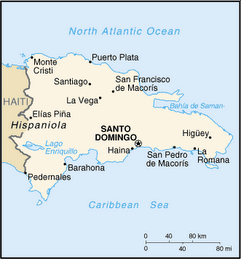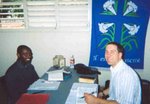He went to see his parents who came through the earthquake fine.
 His brother, though, suffered the loss of his home and two of his children received injuries. When the earthquake hit his brother and his wife were not yet home so the children were alone. The oldest child, 11 yrs. old, was able to get all the children out of the house. But then they stood next to the building next door, about 3 stories high, which collapsed and two of the children were injured anyway. They took them to "Doctors Without Frontiers" who had already been working in the city and had their installations set up. The children were cared for and are recovering, but the parents could not find the children when they got home and it was not until the next day that they realized they were all alive and at the hospital.
His brother, though, suffered the loss of his home and two of his children received injuries. When the earthquake hit his brother and his wife were not yet home so the children were alone. The oldest child, 11 yrs. old, was able to get all the children out of the house. But then they stood next to the building next door, about 3 stories high, which collapsed and two of the children were injured anyway. They took them to "Doctors Without Frontiers" who had already been working in the city and had their installations set up. The children were cared for and are recovering, but the parents could not find the children when they got home and it was not until the next day that they realized they were all alive and at the hospital.Obed also
 talked about the violence in the country that is continually escalating. People are desperate to get food. Looting is rampant. He says that by 6PM everyone tries to find cover or shelter before it gets dark. He also referred to the kidnapping of children and thinks they will be most likely sold for organ trafficking. About five years kidnapping was a serious problem in Haiti and most of the children that were taken were sold for this purpose. The government made it a priority to get these kidnappers and many were put behind bars. Many of the people that were captured and put in jail have now escaped. It has been reported that 5,300 prisoners escaped in the earthquake. One Santiago newspaper ran a story about a Haitian woman who identified her rapist, here in the city, so we know they are crossing the border.
talked about the violence in the country that is continually escalating. People are desperate to get food. Looting is rampant. He says that by 6PM everyone tries to find cover or shelter before it gets dark. He also referred to the kidnapping of children and thinks they will be most likely sold for organ trafficking. About five years kidnapping was a serious problem in Haiti and most of the children that were taken were sold for this purpose. The government made it a priority to get these kidnappers and many were put behind bars. Many of the people that were captured and put in jail have now escaped. It has been reported that 5,300 prisoners escaped in the earthquake. One Santiago newspaper ran a story about a Haitian woman who identified her rapist, here in the city, so we know they are crossing the border.We asked him about the food situation. He said that there were some stores open but that all the prices had almost doubled. There also are no mechanisms in place for these stores to receive more supplies so they can only sell what they have in stock. We have noticed that the prices have also gone up in the DR. The government says that the provisions that are going to Haiti are surplus supplies and should not affect the availability of food here - but that is not the reality when you go to the store, especially in the poorer areas of town.
Other reports say that the Haitian hospitals are all out of morphine and analgesics, so they have nothing to
 give to their patients that have suffered amputations. The majority of the operations have been limb removal. The hospitals desperately need supplies: gauze, bandages, cotton, ibuprofen, antibiotics, intravenous solution, ... and the list goes on. The need is made worse by the fact that people are attacking UN convoys that are delivering supplies hoping to find food for their families.
give to their patients that have suffered amputations. The majority of the operations have been limb removal. The hospitals desperately need supplies: gauze, bandages, cotton, ibuprofen, antibiotics, intravenous solution, ... and the list goes on. The need is made worse by the fact that people are attacking UN convoys that are delivering supplies hoping to find food for their families.In spite of all the tragedy and disaster we still find comfort and joy in our Savior's arms, remembering all he has done for us and rejoicing in his promises of forgiveness and eternal life when we leave this vale of tears. We continue to pray for wisdom and guidance in the midst of such sorrow and hurt and give thanks to a loving and merciful God who watches over His church and keeps us and guides in all His ways. It was with joyful hearts that we shared a devotion today with Rona and Obed and we give thanks to God for watching over them and their families.






















